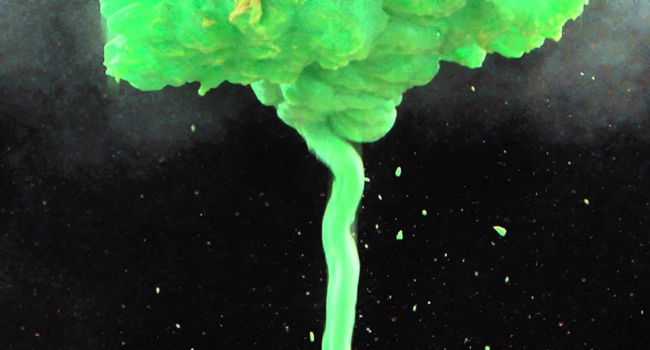 20. Jon Hopkins – Immunity
20. Jon Hopkins – Immunity
Electronic music to me sounds very computer generated. I realize this is a stupid thing to say in more ways than one, but bear with me. Too often the idiosyncrasy and soul of more traditional genres of music gets lost in the restrictive fakeness of the electronic music paradigm. Jon Hopkins’ Immunity should theoretically be no different. It frequently blips, glitches and stutters outside of it’s core rhythm and pace, sending soundscapes careening in different directions entirely. Yet somewhere in the middle of Purity Ring collaboration “Breathe This Air,” everything clicks into place; each abrupt tonal shift, each sandpaper textured noisy element adds idiosyncrasy and humanity to what elsewhere might’ve been just handled as pretty computer music. Hopkins, who has toured with Coldplay and clearly influences some of their more adventurous forays, taps into an essential living, breathing moment of his music and pushes Immunity further than most anything electronic this year. Don’t sleep on the plaintive and devastating title track, which builds and earns the album’s only vocal moment with vital beauty. – Tyler Remmert
 19. Deerhunter – Monomania
19. Deerhunter – Monomania
Deerhunter’s fifth album, Monomania, is Dirty South meets the inside of a heroin addict’s garage. It’s like a bizarre and unpredictable blend of Lou Reed, The Pixies, and maybe a little Bob Dylan (the folky feel and cigarette-ravaged vocals on “Pensacola” bring him to mind). The entire album is wrapped in a thick layer of fuzz, but underneath lies some impressive songwriting. Deerhunter croons and coaxes and consumes, hypnotizing listeners with laid-back grooves (“T.H.M.” and “The Missing”) before drowning them in waves of crunchy distortion. At times, it sounds like more typical rock music, but never for long–“Leather Jacket II” starts off with a dreamy guitar riff, but becomes glitchy and infiltrated with feedback before ultimately collapsing in on itself. Overall, Deerhunter does a fantastic job of challenging listeners without totally alienating them. Monomania is dirty, but still engaging and sometimes even beautiful. -Hannah Lorenz
 18. Chance the Rapper – Acid Rap
18. Chance the Rapper – Acid Rap
When listening to Chicagoan Chance the Rapper’s Acid Rap, the phrase “wildly creative” can’t help but pop into mind. From beginning to end, the rapper born Chancellor Bennett’s approach is refreshing; it begins and ends by challenging hip-hop conventions like disposable introductions and conclusions on “concept albums.” “Good Ass Intro” rides a piano groove and soulful backing female vocals and “Everything’s Good” is more than another bookend. From fruit snacks to chinchillas, from lupus to caterpillars, Chance and his guests (including prominent appearances from Donald Glover’s hip-hop alter-ego Childish Gambino, Vic Mensa, Twista, Lili K. and others) provide a mind-altering trip down many tropes. The magic of Acid Rap is how well it synthesizes all the best elements of modern hip-hop: innovative wordplay, brutally honest commentary (without the gangsta braggadocio), an exquisite and self-deprecating sense of humor, intricate rhythms and jazzy grooves, all across a lush, dense atmosphere crafted by innovative samples and weaving in this “who’s who” of guests. Although released as a free mix tape, it sold enough bootlegs to hit #64 on the Billboard charts. Major labels are circling Chance like vultures, so Acid Rap might be his last release with this modus operandi. -Craig Bechtel
 17. Deafheaven – Sunbather
17. Deafheaven – Sunbather
I can say with almost 100% certainty that the only reason Sunbather does not make an appearance in the top 3 is due to our staff (great thought they may be) overlooking the metal genre when looking for new music. And truly, this will be indicative of year-end lists on the whole. But it’s hard to blame them. Extreme metal these days is hardly concerned with transcending its boundaries, but with this release San Francisco’s Deafheaven have created a seminal work, practically redefining metal altogether. Calling it “blackgaze” is about as good of an attempt to sum up this music as you’ll find, but there’s something here that wasn’t on the band’s debut Roads to Judah. If the title is any indication, there’s a brightness to this record. Out of all the general darkness and despair that typically goes with the shrieky vocals that characterize black metal comes glimmer’s of happiness and hope. The same themes of regret, loss and fear can be found on Sunbather, but rather than being profane or forcing anger, Deafheaven explores the real feelings behind them all. It’s uncharacteristically human. “It’s 5 A.M…and my heart flourishes at each passing moment. Always and forever.” What the hell is this? It’s goddamn beautiful. I don’t even know how else to sum this record up and do it justice. The emotion is so tangible, the music is powerful, almost as powerful as the words. I don’t think I’ve EVER felt that way about a metal record. And I like metal. – Chris Favata
 16. Volcano Choir – Repave
16. Volcano Choir – Repave
I think people latched on to Repave for their own reasons. The deep, emotionally rich story stems into so many different directions with stories on relationship, personal reflection and worldly philosophy so vast that there was something for everyone. Bon Iver fans inevitably connected with Volcano Choir’s second record due to the familiar and cozy sounds of Justin Vernon’s voice, and outsiders found relief in a more scaled back version of heart-filled content. The beauty of Repave was the sounds so Midwestern and alternative, taking inspiration from some of recent rock’s greats, plus adding Volcano Choir’s own styling for a once-in-a-lifetime happenstance collaborative. The album was too short to get sick of but just expansive enough to be fulfilling and demanding of a second listen. We learned something more every time we gave it a spin. -Jason Radford
 15. Pusha T – My Name Is My Name
15. Pusha T – My Name Is My Name
I’ve given two albums a five ‘stache rating since I joined the Pop ‘stache family. The first was Childish Gambino’s Camp, which ended up being an opinion that was not shared by other Chicago-based outlets who shall remain nameless. The second came late this year after suffering through stuff like the Macklemore Era and everything Big Sean did other than letting everyone hear “Control,” even though we all skipped his verse. Pusha T released his first “solo” album and I almost broke my Spotify app because of it. From “Numbers on the Board” to “S.N.I.T.C.H.” to the nearly perfect “Nosetalgia,” My Name Is My Name got more plays than any album I gave a shot to this year. It’s pure poetry. Lyrical crack. I got high. I became a fiend. I needed my fix, daily. Pusha’s never stopped dealing, he just found a better way to move weight. -Matt Wink
 14. Julianna Barwick – Nepenthe
14. Julianna Barwick – Nepenthe
This may seem reductive, but the quality of most music is defined by the atmosphere in which it is first listened to. Extreme example, but imagine that the first time you listened to Deafheaven’s sublime Sunbather while getting a massage. Such an experience might not seem ideal. So it is with this caveat that I say Julianna Barwick’s Nepenthe was the most gorgeous record of 2013, if listened to properly – at night, alone, lying on the ground with eyes closed. After years spent emulating and adapting her atmospheric peers, Barwick gave up the illusion of disparate sonics and recorded Nepenthe in Iceland, alongside a few members of Sigur Rós. The result, sometimes directly recalling Sigur Rós’ ( ) period (“Pyrrhic” even grabs some of Sigur’s ghostly vocal blips), is grandiose yet intimate, decidedly lyrical yet devoid of nearly any actual words. Barwick has made a career on the schtick of creating orchestral soundscapes using only looped and modified tracks of her own voice, yet Nepenthe is the realization of that potential schtick as an emotionally resonant core. No track stands out, yet the album is far from one long transition to the next element. Nepenthe feels essential in the way Agaetis Byrjun felt essential, as it represents a moment for Julianna Barwick in which she becomes a vital artist, and not just a interesting side note in atmospheric music. Given the right environment, Nepenthe is as transformative and powerful as anything released this year. -Tyler Remmert
 13. Kurt Vile – Wakin on a Pretty Daze
13. Kurt Vile – Wakin on a Pretty Daze
It’s amazing that Kurt Vile still manages to sound so relaxed. In addition to being a father of two, he divides his time between touring, producing albums for other artists, and hunkering down in the studio with The Violators to make records of his own. While 2011’s Smoke Ring for my Halo showed the more subdued, introspective side of Vile’s songwriting, Wakin on a Pretty Daze allows him to get a little more indulgent. Seven of the album’s eleven songs go longer than five minutes, a true testament to this lineup of his backing band, The Violators. “Wakin’ On a Pretty Day”, the almost-title track that opens the album, is one of the best of the year. It’s over nine minutes of breathy vocals and effects-laden, summery guitars that wind around each other in a 1970s Keith Richards/Ronnie Wood-inspired haze. You don’t get much more mellow than this. -Bryn Rich
 12. My Bloody Valentine – m b v
12. My Bloody Valentine – m b v
If My Bloody Valentine’s m b v was not the best record of 2013, it was nonetheless the most pleasant surprise. The biggest surprise was not that the long-awaited follow-up to their classic masterpiece Loveless actually got released, but how good an album m b v turned out to be. Fans had long prepared themselves for a tremendous let-down after repeated spins of the 1991 shoegazer touchstone Loveless, preceded by the 1990 beacon that was the Glider EP (which critic Robert Christgau described as “the reliable rhythm of a giant linoleum buffer systematically rubbing the skin off your soul”). Where m b v succeeds it sounds like a continuation of Loveless and yet offers enough new ideas and sounds to stand on its own. The Valentines’ auteur, Kevin Shields again heavily relies on his “glide guitar,” using modified tremolo arms that allow him to bend pitches while strumming, creating a woozy, “in and out of tune effect,” and there’s his and Bilinda Butcher’s sleepy, dreamy vocals, but there’s also jungle moments, lots of organ, powerful drums, and plenty of sonic mind-fucks. Although it doesn’t top Loveless, it’s a worthy successor, an epilogue long in the making, and a release almost worth the wait. -Craig Bechtel
 11. Arctic Monkeys – AM
11. Arctic Monkeys – AM
Titled in homage to The Velvet Underground’s VU, the fifth outing from the quartet hailing from a suburb of Sheffield, England finds them furthering their progression from youthful exuberance to “spot the influence” mix and match “middle age,” with lyrical pop culture references a’plenty. Although it doesn’t have the bracing, propulsive pace of their earlier material, and at first it seems a dour affair, after repeated spins, the winning melodies and creative wordplay grow on you. On “Do I Wanna Know?” AM sounds like England’s answer to The Strokes with a little Billy Squier’s “The Stroke” thrown in for good measure. Check out the “shoo-wop” choruses and Stones references on “I Want It All,” the Beatles and sci-fi references on “Arabella” and the hilarious “Why’d You Only Call Me When You’re High?” For a leisurely, nightclub-type number, spin the concluding number brimming with clever metaphors, “I Wanna Be Yours.” Josh Homme of Queens Of The Stone Age provides guest vocals on “Knee Socks” and “One For The Road.” Finely attuned listeners may hear bits of Spiritualized, Oasis, Black Sabbath and even Hot Hot Heat. -Craig Bechtel



